

MOOC and schools. This week I answer to a survey of Liz, and the month of January I answered to another survey.
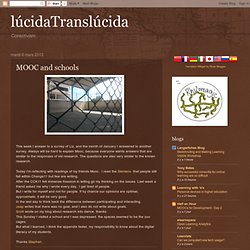
Always will be hard to explain Mooc, because everyone wants answers that are similar to the responses of old research. The questions are also very similar to the known research. Today I'm reflecting with readings of my friends Mooc. I read the Siemens that people still fall within Change11 but few are writing. After the CCK11 felt immense freedom in letting go my thinking on the issues. But I write for myself and not for people. In the last day to think back the difference between participating and interacting. Jaap writes that there was no goal, and I also do not write about goals.
Scott wrote on my blog about research into dance, thanks. This Sunday I visited a school and I was depressed. the spaces seemed to be the zoo cages. But what I learned, I think the appendix faster, my responsibility to know about the digital literacy of my students. Is it or is it not a MOOC? (#eduMOOC) The latest massively open course, offered by Stanford University on Artificial Intelligence is raising the question again.
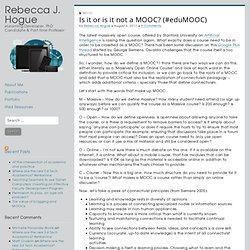
What exactly does a course need to be in order to be classified as a MOOC? There has been some discussion on this Google Plus thread started by George Siemens. Osvaldo challenges that the course itself is too structured to be MOOC. So, I wonder, how do we define a MOOC? I think there are two ways we can do this, either literally as a "Massively Open Online Course" and look at each word in the definition to provide critical for inclusion, or we can go back to the roots of a MOOC and add that a MOOC must also be the realization of connectivism pedagogy – which adds additional criteria – specially those that define connectivism.
Let's start with the words that make up MOOC: M – Massive – How do we define massive? O – Open – How do we define openness. The #MOOC discourse continued #eduMOOC. I read this post on MOOC with interests.
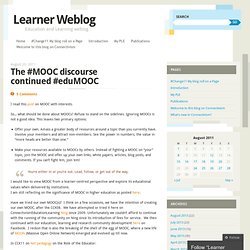
So… what should be done about MOOCs? Refuse to stand on the sidelines. Ignoring MOOCs is not a good idea. This leaves two primary options: Offer your own. You’re either in or you’re out. I would like to view MOOC from a learner-centred perspective and explore its educational values when delivered by institutions. I am still reflecting on the significance of MOOC in higher education as posted here.
Have we tried our own MOOC(s)? In CCK11 on Net pedagogy on the Role of the Educator: How often do we read about the importance of teachers in education? There has been a lot of promotional news about the AI course offered by Stanford University. Pedagogy First! Here I go thinking that I can quickly finish this task as I’m on catch up mode big time.
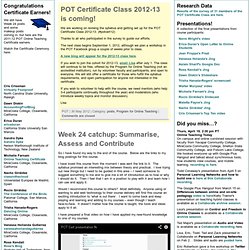
I should have known better!! Having watched the video and read the articles, I am left thinking about Issac Asimov’s Foundation series. A lot of what was said makes me think that we have to be very careful where we go with learning. I think we have to be careful to ensure that students are given the problem solving skills to interact with the vast range of information available to us rather than just relying on being able to find out what we want to know when we want to know about it. The ability to have a learning network approach is very important but so is the ability to learn through building and sharing. First the video I usually turn up my nose at theory as I see myself as a more application person, but the content of this video totally hooked me. As time went on and as my study needs changed, I moved to extramural study (management and maths) in the late 1980s to the early 2000s.
Here a MOOC, there a MOOC « Lisa’s. A couple of things came together recently, which is almost always my foundation for a blog post.
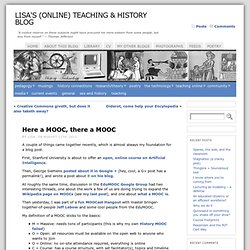
First, Stanford University is about to offer an open, online course on Artificial Intelligence. Then, George Siemens posted about it in Google + (hey, cool, a G+ post has a permalink!) , and wrote a post about it on his blog. At roughly the same time, discussion in the EduMOOC Google Group had two interesting threads, one about the work a few of us are doing trying to expand the Wikipedia page on MOOCs (see my last post), and one about what a MOOC is. Then yesterday, I was part of a fun MOOCast Hangout with master bringer-together-of-people Jeff Lebow and some cool people from the EduMOOC. MOOC – A solution to Higher Education and Future Learning.
Is MOOC the solution to future learning, especially online education and learning in Higher Education?
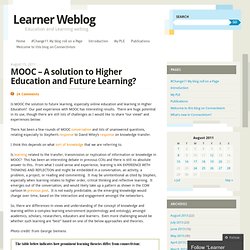
Our past experience with MOOC has interesting results. There are huge potential in its use, though there are still lots of challenges as I would like to share “our views” and experiences below: There has been a few rounds of MOOC conversation and lots of unanswered questions, relating especially to Stephen’s response to David Wiley’s response on knowledge transfer. I think this depends on what sort of knowledge that we are referring to. Is learning related to the transfer, transmission or replication of information or knowledge in MOOC? So, there are differences in views and understanding of the concept of knowledge and learning within a complex learning environment (epistemology and ontology), amongst academics, scholars, researchers, educators and learners. Photo credit: from George Siemens.